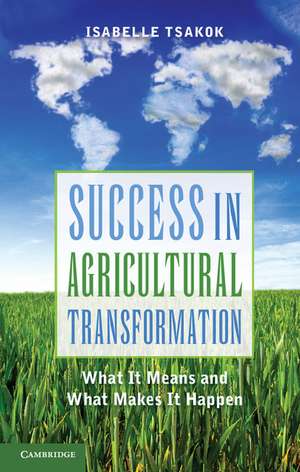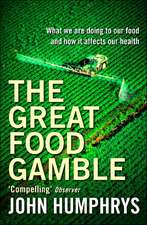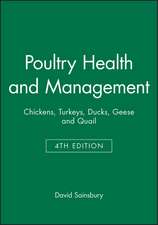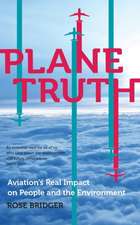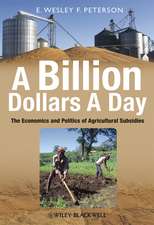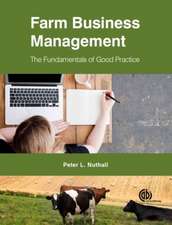Success in Agricultural Transformation: What It Means and What Makes It Happen
Autor Isabelle Tsakoken Limba Engleză Paperback – 31 iul 2011
| Toate formatele și edițiile | Preț | Express |
|---|---|---|
| Paperback (1) | 293.64 lei 6-8 săpt. | |
| Cambridge University Press – 31 iul 2011 | 293.64 lei 6-8 săpt. | |
| Hardback (1) | 796.09 lei 6-8 săpt. | |
| Cambridge University Press – 7 aug 2011 | 796.09 lei 6-8 săpt. |
Preț: 293.64 lei
Nou
Puncte Express: 440
Preț estimativ în valută:
56.19€ • 58.78$ • 46.68£
56.19€ • 58.78$ • 46.68£
Carte tipărită la comandă
Livrare economică 03-17 aprilie
Preluare comenzi: 021 569.72.76
Specificații
ISBN-13: 9780521717694
ISBN-10: 0521717698
Pagini: 424
Ilustrații: 47 b/w illus. 1 table
Dimensiuni: 152 x 228 x 23 mm
Greutate: 0.59 kg
Editura: Cambridge University Press
Colecția Cambridge University Press
Locul publicării:New York, United States
ISBN-10: 0521717698
Pagini: 424
Ilustrații: 47 b/w illus. 1 table
Dimensiuni: 152 x 228 x 23 mm
Greutate: 0.59 kg
Editura: Cambridge University Press
Colecția Cambridge University Press
Locul publicării:New York, United States
Cuprins
Summary; Introduction; Part I. The Many Faces of Agricultural Transformation in an Industrializing World and What It Means: 1. The industrialized world: success in agricultural transformation in England, Japan, and the United States of America; 2. The developing world: contribution of agriculture in a country's drive for industrialization and improved well-being for all: A. Countries widely recognized as having been high performers; B. Selected developing countries with substantial but uneven progress towards industrial status and broad-based wealth; C. Review of selected quantitative assessments of the contribution of agriculture to overall growth and poverty reduction; D. Success in agricultural transformation - important for overall development? What we learn from this selective review; Part II. Success in Agricultural Transformation: What Makes It Happen?: 3. Success in agricultural transformation: necessary conditions; 4. Success in agricultural transformation: necessary but not sufficient conditions?; 5. Success in agricultural transformation: missing conditions; 6. Success in agricultural transformation: the public foundations of private agriculture; Annexes. A note on the methodology of research of this book: A.1. Introduction; A.2. Proposed approach using cross country data and case studies; A.3. Popper's methodology of science: refutations of bold conjectures; A.4. Seeking refutations as empirical tests of hypotheses not their confirmations: practical considerations.
Recenzii
'Should developing countries invest in agriculture to spur growth, or tax agriculture to subsidize industry? Tsakok's examination of the fundamental evidence for these canonical economic development strategies results in a volume that is an invaluable reference to anyone making a first venture into development policy. The approach is comprehensive and nuanced, but absent the jargon and meaningless details that often obscure economic policy texts. This may well become the definitive treatment of what are the most important issues in development policy.' David R. Just, Cornell University
'Based on refutable and testable hypotheses, we finally have a serious assessment of what 'good' government can and should do to promote small-scale agriculture to reduce rural poverty. The case studies and historical evolution evaluated in this book will be welcomed by all those concerned with agricultural transformation and poverty.' Gordon C. Rausser, University of California, Berkeley
'For professionals and policy makers, a must-read for those who are willing to reassess the role of agricultural development with an open mind. For the general public, the book tells the story of how successful agricultural transformation has saved humankind from the dire predictions of the Malthusian Law of Population. For all, it is a call to action against self-serving governance that traps millions of smallholders in stagnant agricultures and soul-wrenching poverty.' Robert Thompson, Chicago Council on Global Affairs and University of Illinois, Urbana-Champaign
'This is a marvelous book. The case studies are fascinating, the methodology used for interpreting them is innovative (and provocative), and the conclusions about the critical role of sustained support from the public sector for successful agricultural transformation are exactly right. Everyone interested in why economic development is so hard needs to read this book.' C. Peter Timmer, Harvard University
'The results of the country analyses in this book are original and relevant, demystifying many widely accepted convictions supposedly verified by econometric estimations. One belief challenged is that agricultural growth in developing countries always leads to a broad-based improvement in farm family incomes and development more generally. In contrast, Isabelle Tsakok, making use of a wealth of information from many nations, identifies five conditions common to all successful transformations of developing country agriculture and rural poverty alleviation. The comparative histories of agriculture in seventeen countries, both developed and developing, make this work a unique and valuable resource for those working in agriculture and rural development.' Alberto Valdés, Catholic University of Chile
'The author brings considerable energy and resources to the task at hand. She effectively mobilises the intellectual capital accumulated by agricultural economists, development economists and economic historians over several decades and does so in a large number of countries.' Michel Petit, European Review of Agricultural Economics
'Based on refutable and testable hypotheses, we finally have a serious assessment of what 'good' government can and should do to promote small-scale agriculture to reduce rural poverty. The case studies and historical evolution evaluated in this book will be welcomed by all those concerned with agricultural transformation and poverty.' Gordon C. Rausser, University of California, Berkeley
'For professionals and policy makers, a must-read for those who are willing to reassess the role of agricultural development with an open mind. For the general public, the book tells the story of how successful agricultural transformation has saved humankind from the dire predictions of the Malthusian Law of Population. For all, it is a call to action against self-serving governance that traps millions of smallholders in stagnant agricultures and soul-wrenching poverty.' Robert Thompson, Chicago Council on Global Affairs and University of Illinois, Urbana-Champaign
'This is a marvelous book. The case studies are fascinating, the methodology used for interpreting them is innovative (and provocative), and the conclusions about the critical role of sustained support from the public sector for successful agricultural transformation are exactly right. Everyone interested in why economic development is so hard needs to read this book.' C. Peter Timmer, Harvard University
'The results of the country analyses in this book are original and relevant, demystifying many widely accepted convictions supposedly verified by econometric estimations. One belief challenged is that agricultural growth in developing countries always leads to a broad-based improvement in farm family incomes and development more generally. In contrast, Isabelle Tsakok, making use of a wealth of information from many nations, identifies five conditions common to all successful transformations of developing country agriculture and rural poverty alleviation. The comparative histories of agriculture in seventeen countries, both developed and developing, make this work a unique and valuable resource for those working in agriculture and rural development.' Alberto Valdés, Catholic University of Chile
'The author brings considerable energy and resources to the task at hand. She effectively mobilises the intellectual capital accumulated by agricultural economists, development economists and economic historians over several decades and does so in a large number of countries.' Michel Petit, European Review of Agricultural Economics
Notă biografică
Descriere
Isabelle Tsakok looks for patterns common to cases of successful agricultural transformation and then tests them against other cases.
